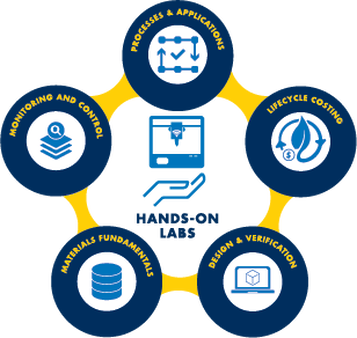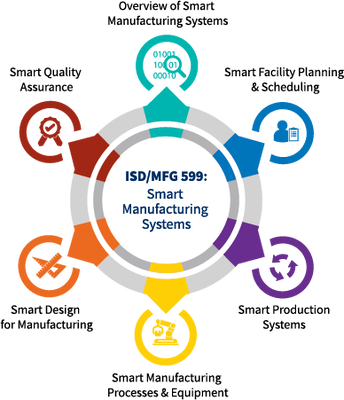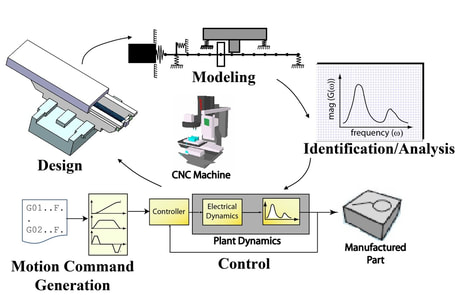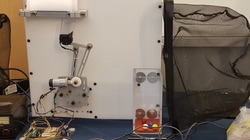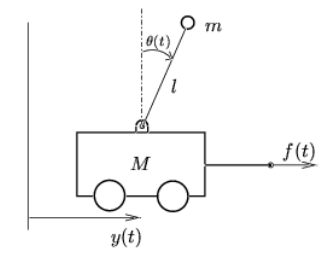Graduate Courses
ISD/MFG 599 FND: Foundations in Smart Additive Manufacturing
|
Prerequisites:
None - Open to undergraduate seniors and graduate students Course Description: This course provides foundational knowledge and skills in smart additive manufacturing. Specifically, it will cover: AM workflow, processes and applications; design and verification; material characterization and processing; monitoring, diagnostics and control; and lifecycle economic and environmental considerations, all with emphasis on practice. The connections of these topics to smart manufacturing technologies will be specifically highlighted. Hands-on labs and industrial case studies will be used to reinforce the course material. The course will be team-taught in five interconnected modules (each with a lab) described in syllabus. Click to view sample syllabus |
ISD/MFG 599 SMS: Smart Manufacturing Systems
|
Prerequisites:
None - Open to undergraduate seniors and graduate students The fourth industrial revolution (or Industry 4.0) has created a new paradigm in manufacturing and provided tremendous opportunities for achieving smart manufacturing systems (SMS). A SMS is defined as a fully integrated, collaborative manufacturing system that responds in real time to meet changing demands and conditions in the factory, in the supply network, and in customer needs (NIST). According to a 2018 Deloitte study, today’s industry is experiencing exciting and exponential change, as technologies such as artificial intelligence (AI), robotics, and Internet of Things (IoT) are rapidly changing the workplace. The skills gap may leave an estimated 2.4 million positions unfilled between 2018 and 2028, with a potential economic impact of $2.5 trillion. |
Course Description:
The purpose of this SMS course is to equip students with the knowledge and skills needed to meet the demands of the manufacturing workforce of the future. It provides an overview of manufacturing systems from product design to facility planning, processes, production systems, and quality control techniques. The role of smart technologies, like data analytics, cloud computing and automation in reshaping manufacturing engineering is emphasized. Course content is reinforced through labs and case studies.
Click to view sample syllabus
The purpose of this SMS course is to equip students with the knowledge and skills needed to meet the demands of the manufacturing workforce of the future. It provides an overview of manufacturing systems from product design to facility planning, processes, production systems, and quality control techniques. The role of smart technologies, like data analytics, cloud computing and automation in reshaping manufacturing engineering is emphasized. Course content is reinforced through labs and case studies.
Click to view sample syllabus
ME 584: Advanced Mechatronics in Manufacturing
|
Prerequisites:
ME 461 or equivalent Course Description: This course teaches theoretical principles and practical techniques for controlling mechatronic systems in the context of advanced manufacturing applications. Specifically, the electro-mechanical design/modeling, basic/advanced control, and real-time motion generation techniques for computer-controlled manufacturing machines are studied. Hands-on labs and industrial case studies are used to re-enforce the course material. This course receives rave ratings from students as a very enjoyable, intellectually stimulating and practical course Click to view sample syllabus |
Undergraduate Courses
ME 350: Design and Manufacturing II
|
Prerequisites:
ME 211, ME 240, ME250, preceded or accompanied by ME 382. I, II (4 credits) Course Description: This course focuses on principles of mechanical design and manufacturing, analysis, synthesis and selection of mechanisms, machine components and associated manufacturing processes. The course consists of three hour lecture, one two-hour lab and hands-on design projects. View Course Profile here. Click to view sample syllabus |
ME 240: Introduction to Dynamics and Vibrations
|
Prerequisites:
Physics 140, preceded or accompanied by Math 216 Course Description: This course focuses on the following topics- Vector description of force, position, velocity and acceleration in fixed and moving reference frames. Kinetics of particles, of assemblies of particles and of rigid bodies. Energy and momentum concepts. Euler's equations. Moment of inertia properties. The simple oscillator and its applications. View Course Profile here. Click to view sample syllabus |
Tutorials for Professional Engineers
Passive Vibration Isolation
Vibration isolation is a requirement for precision machines, and passive isolators are a reliable and inexpensive option available for vibration isolation. Therefore, precision machine designers and end users have a lot to gain by learning how to achieve the best vibration isolation performance using passive isolators. This tutorial demonstrates how to identify vibration sources, model a passive isolation system and determine if it meets the vibration isolation needs of a machine/application. Additionally, it focuses on how to optimize the the placement of passive isolators to maximize vibration isolation performance. This tutorial is given at the annual general meetings of the American Society for Precision Engineering
Software-based Vibration Reduction for Precision Machines
There are many instances where manipulating motion commands through software modifications provides a much simpler, cost effective and practical option for reducing vibration compared to making hardware improvements to a machine. This tutorial teaches various techniques for reducing motion-induced vibration in precision machines via software means. It is given at the annual general meetings of the American Society for Precision Engineering.

